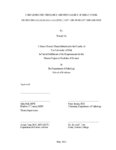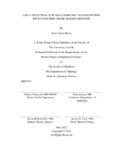TO
1 - 25 of 5
| Creator | Title | Description | Subject | Date | ||
|---|---|---|---|---|---|---|
| 1 |
 |
Vu, Wendy | Comparing the virulence and prevalence of shiga toxin-producing escherichia coli (STEC) O157 and non-O517 serogroups | Shiga toxin-producing Escherichia coli (STEC) are bacteria known to cause human illness. The Center for Disease Control and Prevention estimates that 265,000 STEC infections occur in the United States (U.S.) annually; symptoms range from mild diarrhea to life-threatening hemolytic uremic syndrome. S... | Escherichia coli; serogroups | 2012-05 |
| 2 |
 |
Martin, Julia Vienna Gardner | The role of socioeconomic status in understanding ethnic differences among remerging adults with type 1 diabetes | Emerging adulthood is often characterized as a "high-risk period" for emerging adults (EAs) with T1D as they have higher HbA1c (a metric of glucose control across the last 3- 4 months) and poorer self-management compared to other age groups. Emerging adults may also experience disparities associated... | 2023 | |
| 3 |
 |
Ribble, Leah | The implications of childhood maltreatment and current life stress for pregnant women's hair cortisol concentrations | The hypothalamic-pituitary-adrenal (HPA) axis is one of the core components of the body's stress system. As such, the HPA axis is responsive to many different stressors, including those in childhood-such as childhood maltreatment-as well as sources of current life stress. The product of the HPA axis... | 2023 | |
| 4 |
 |
Lauze-Reyes, Jesse | Early detection of human chorionic gonadotrophin with consumer-grade testing methods | This study examined the ability of consumer-grade pregnancy tests to detect urine hCG at low concentrations early in a person's luteal phase and before the expected menses. Testing was performed with a commercially available pregnancy test strip that has a sensitivity of 10 mIU/mL. This is compared ... | 2022 | |
| 5 |
 |
Kearns, Ireland Rose | Effects of trem-1 expression on acute phase seizures in a mouse model of viral-induced epilepsy | Around 70 million people worldwide suffer from epilepsy, a neurological disorder that causes unprovoked and persistent seizures. A dominant cause of acquired epilepsies are from injuries to the central nervous system (CNS), such as viral infection of the CNS that results in brain inflammation (encep... | 2022 |
1 - 25 of 5
